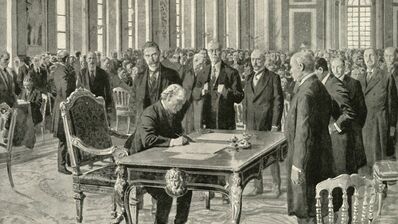 “Injustice, arrogance, displayed in the hour of triumph will never be forgotten or forgiven.” – Lloyd George, 1919 “Those three all-powerful, all-ignorant men… sitting there carving continents with only a child to lead them.” – Arthur Balfour German Victories on the Eastern and Southern Fronts After defeating the Italians at Caporetto and the defeat of Romania and Russia, in early 1918, a million German soldiers had been released to join their comrades on the Western Front for the last great German offensive of the war. Western Offensive By April 1918, Ludendorff’s armies were back on the Marne River and Field Marshal Sir Douglas Haig was issuing his order: “With our backs to the wall… each of us must fight on to the end… Every position must be held to the last man: there must be no retirement.” America Upsets the Balance of Power in Europe In the end, the Americans proved decisive. By spring 1918,300,000 American soldiers were in France; by summer, 1,000,000. With fresh American soldiers moving into the front lines at 250,000 a month, German morale sank. Peace Overtures On October 5, 1918, Prince Max of Baden sounded out President Wilson on a peace based on the Fourteen Points he had laid out in January. Three days later, Wilson asked Prince Max if Germany would accept the points. On October 12, Prince Max gave assurances that his object in “entering into discussions would be only to agree upon practical details for the application” of the Fourteen Points to a treaty of peace.
0 Comments
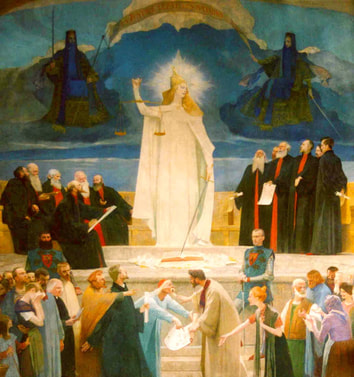
To view a video of this presentation, click here.
To view a PowerPoint presentation of this article, click here. To listen to the audio of this presentation, click here. Despite anti-Christian prejudices, it is to the teachings and example of Jesus Christ that women owe most of their freedoms. The advent of Christianity raised the dignity, freedom and rights of women to levels never before known in any other culture or religion. Indeed, as one historian put it: “The birth of Jesus was the turning point in the history of women.” As a result of the teachings and example of Jesus Christ, women in much of the world today, especially in the West, enjoy far more privileges and rights than at any other time in history. Women in the Middle East By way of contrast, one only needs look at how women are treated in those countries where Christianity has had little influence, for example in the Muslim Middle East. Christian women have been publicly stripped and flogged in Sudan for failing to wear the Islamic Abaya (a black garment that covers the head, face and the entire body). Under the Taliban in Afghanistan women were forbidden to go to school, to work outside the home, or even to walk without their whole face and head being covered under the Abaya. Women have been arrested and jailed in Iran for wearing lipstick. In Saudi Arabia, it is illegal for women to drive a motor vehicle.  Remembrance Day Throughout the English speaking world, the 11th November is observed as a Remembrance Day to solemnly recall the end of hostilities of World War One at the 11th hour of the 11th day of the 11th month of 1918. In time, it has come to be observed as a Memorial Day for all who died in both World Wars and in other subsequent conflicts. 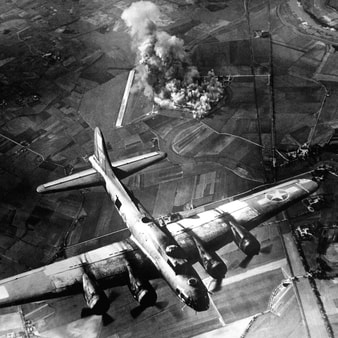 Bombarded On Mission outreaches in Sudan I experienced aerial, artillery and rocket bombardments. However these experiences were insignificant compared to that of my parents in the Second World War. My Father served as a bombardier in the Royal Artillery in the British Army for the whole 6 years of the war. He told me of the Heinkel III’s coming over his military base and turning his barracks into matchsticks as he lay flat on the parade ground with debris blown high into the air pummelling him into the ground! My mother was only 6 years old when she experienced her first bombing. It was September 1940, she was at the circus in Berlin when the British bombed them. She was almost trampled in the stampede to flee the exploding bombs. Many times my mother heard the air raid sirens and had to rush to the air raid shelters. Frequently she saw the green and red parachute flares dropped by the lead bombers to guide the thousand bombers where to unleash their cargo of death and destruction. Her neighbourhood was turned into blazing rubble. 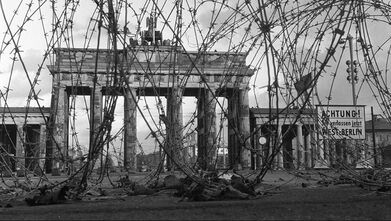 9 November, marks the fall of the Berlin Wall in 1989. A speech at Westminster College, Fulton, Missouri, 5 March 1946, declared that “An Iron Curtain has descended across the continent”. From Stettin in the North to Trieste in the South barbed wire and barricades, walls and machine gun towers were going up, sealing off the captive nations occupied by the Soviet Union from their neighbours in the West. The Iron Curtain divided a continent and trapped hundreds of millions of people under communism. The Soviet dictator, Joseph Stalin, declared that the Second World War was not a disaster but “a great opportunity” to extend communism into the very heart of Europe. 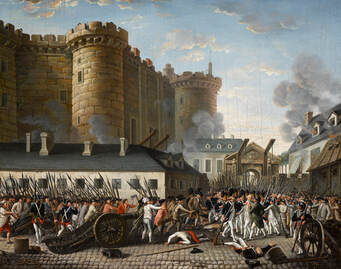
14 July is celebrated in France as Bastille Day. It commemorates the storming of the Bastille and the launch of The French Revolution.
This article can be viewed as a PowerPoint on Slideshare. To hear the audio lecture on The French Revolution, click here. To view the video Presentation click here A Time of Turmoil The French Revolution was one of the most influential events of modern history. The ten-year period from 1789 to 1799 when France went from a Monarchy to a Republic, to a Reign of Terror, to Dictatorship was one of the most tumultuous times in European history. Myth and Reality Much myth and romantic legend has been written on what some politicians would like the French Revolution to have been, but the reality was that the French Revolution was a monstrous horror. In the name of "liberty, equality, fraternity or death!" over 40,000 people lost their heads to the guillotine, 300,000 people were publically executed by firing squads, drownings and other methods of mass murder and ultimately many millions died in the 25 years of war and upheavals that resulted. 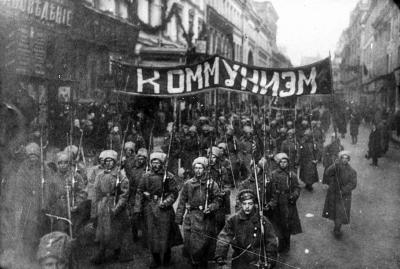
To hear the audio lecture of this article, click here.
To view the video presentation of this article, click here. To view the PowerPoint presentation of this article, click here. Bitter Winter of Discontent The Russian winter of 1916/1917 was one of the coldest in memory. On 23 February (by the old-style Russian calendar, or 8 March, by the Western calendar) 1917, 90,000 textile workers went on strike. By the next day, half of the industrial workers in St. Petersburg were on strike. By the third day, the number had risen to almost a quarter of a million. Defeats Lead to Disaster The continual string of defeats in the First World War, the chronic shortage of food and, perhaps most importantly, the lack of fuel for cooking and heating, led to what was called the Women’s Strike, although far more men were involved. Riots broke out, people were killed. Shops were looted. 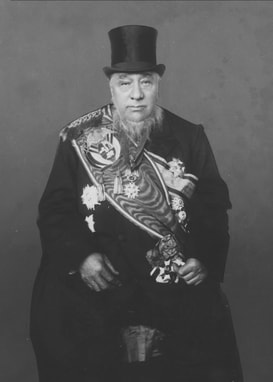
To view a video on this article, click here.
To view a PowerPoint on this article, click here. To listen to an audio of this article, click here. To listen to the radio on this article, click here. 10 October used to be celebrated as Kruger’s Day, a public holiday in South Africa, which marked the birth of this great founding father of our nation. Oom Paul was born on his grandfather's farm at Bulhoek, 10 October 1825. Paul's parents were Casper Kruger and Elsie Steyn. Drought, locusts and migrating herds of buck forced them to lead a nomadic existence in the Karoo. He was hardened by nature and schooled by the Bible. He received only three months of formal education, mostly being home schooled. He read the Bible daily. Voortrekker His father, Casper Kruger, joined the Trek party of Hendrik Potgieter in one of the very first of the expeditions, 1835. As a young boy of 10-years-old, Paul Kruger set out on the Great Trek under Hendrik Potgieter.  “And as it is appointed for men to die once, but after this the Judgment.” Hebrews 9:27 It Is Appointed for Men to Die and Face Judgement To some the doctrine of Eternal Judgment is a great comfort. To others it is a terrifying concept. It is a fearful thing to fall into the hands of the Living God. Man Knows Not His Time The world was informed that the longest ruling dictator in Africa, Marxist terrorist, Robert Mugabe died in a hospital in Singapore. How various people reacted to this news speaks volumes. 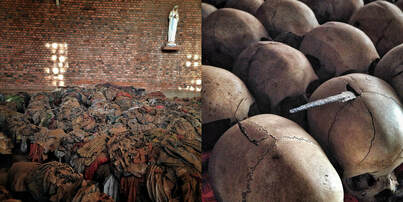 "I know there is a God, because in Rwanda I shook hands with the devil. I have seen him, I have smelt him and I have touched him. I know the devil exists and therefore I know there is a God!" Shake Hands with the Devil These are the words of Canadian General Romeo Dallaire, the Commander of the United Nations Mission to Rwanda (UNIMIR). His book, Shake Hands With the Devil (which has also been made into a dramatic film), documents the unfolding catastrophe, and as he puts it in the subtitle of his book: "The Failure of Humanity in Rwanda. 25 Years Ago As the people of Rwanda soberly reflect on the holocaust which was unleased upon them 25 years ago, April 1994, there are still compelling questions which demand answers. How could such dreadful mass murder take place within sight and sound of United Nations peacekeepers without the international community doing anything to stop it? Could the holocaust in Rwanda have been prevented? What steps must we take to ensure that such atrocities do not occur again? |
Categories
All
Archives
October 2022
|
 RSS Feed
RSS Feed